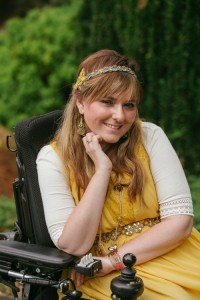 As a child, Ariella Barker grew tired of people placing their hands on her shoulders and asking Jesus to make her walk.
As a child, Ariella Barker grew tired of people placing their hands on her shoulders and asking Jesus to make her walk.
Suffering from spinal muscular dystrophy, a rare condition that causes the curvature of the spine and weakening of the muscles throughout the body, Barker used a motorized wheelchair to get around. Unsurprisingly, faith healing didn’t cure her.
“I would get pulled out of my chair and they would try to force me to walk and I’d fall,” Barker, 34, recalled. “My legs would fall out underneath me… I was always this pity case that someone had to fix.”
However, her brush with faith healing, including a visit to televangelist Benny Hinn, isn’t what caused Barker, raised as a Pentecostal Christian, to convert to Orthodox Judaism.
“I really did not agree with the fundamental tenets of the religion,” Barker said. “I didn’t believe in a God who would sentence someone to a fiery hell if they didn’t believe that this demi-god was the Messiah. Or if a person could commit the most heinous crime and all he had to do was ask God for forgiveness and he’d be forgiven…”
Perhaps most importantly for Barker was Christianity’s stance on asking questions.
“I hated that questions were discouraged,” she said.
In her junior year of high school, Barker watched a video about the Holocaust in her public school and felt something within her.
“It was as if someone was forcing me to watch my family die,” she said.
Her connection to the Jewish nation was strengthened the following summer which she spent taking college credits at Georgetown University.
“I had this magnetic attraction to these people on campus,” she said. “We had kindred spirits. I didn’t know why, but all of a sudden I could make friends whereas before I couldn’t. Then I found out they were all Jewish and I realized that it was something about them.”
However, Barker still didn’t really consider converting until later in law school when an Orthodox rabbi and law professor told her that she would be able to use her motorized wheelchair on Shabbat and holidays.
She converted in 2007 and completed the conversion process in a mikvah on the Upper West Side, a somewhat fraught procedure given that there are few wheelchair accessible mikvas in the world.
The following year she made aliyah and lived in Israel for four years, only moving back because of health issues. A successful litigator, Barker now teaches law at Charlotte Law School and was named Ms. Wheelchair North Carolina, an advocacy position where she works to challenge the stereotypes of the disabled in the media. It is a misrepresentation she believes is similar to the one that Israel faces on a daily basis.
“Film and television are misrepresenting and underrepresenting individuals with disabilities,” Barker said. “They are misshaping society’s perception. We assume if it’s on TV it must be true. It’s the same thing on the news about Israel. We know that CNN makes Israel look bad and it’s not necessarily the truth.”
Barker will be discussing her story and the role of the disabled in the Jewish community with Yachad Associate Director Eli Hagler on Tuesday, 7/15 at 9am when he hosts The Orthodox Union Presents: The Jewish Reaction on the Nachum Segal Network. Listen to the full program.
The words of this author reflect his/her own opinions and do not necessarily represent the official position of the Orthodox Union.